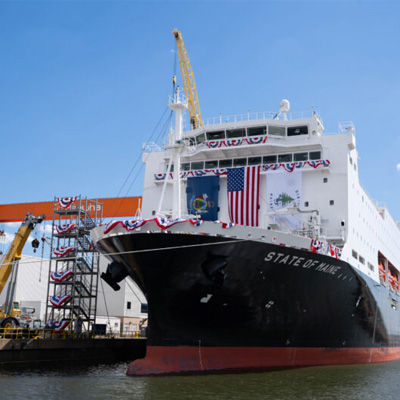Maine Maritime Academy Professors Awarded a Maine Community Foundation Grant to Study PFAS in the Marine Environment
CASTINE, Maine, June 14, 2024 — Maine Maritime Academy, one of the United States’ foremost maritime colleges offering degrees in engineering, science, management, and transportation, announces that Dr. Carey Friedman, Associate Professor of Marine Science and Dr. LeAnn Whitney, Associate Professor of Oceanography, were recently awarded a $77,000 grant from the Maine Community Foundation in support of their research examining the relationship between PFAS in the marine environment and its presence in phytoplankton. Dr. Friedman and Dr. Whitney will be conducting the research in collaboration with Dr. Jitka Becanova, Assistant Research Professor of Oceanography at the University of Rhode Island’s Graduate School of Oceanography.
Maine Maritime Academy Provost Dr. Keith Williamson stated that “Dr. Friedman’s and Dr. Whitney’s research is another great example of the tremendous capability within our faculty at the Academy. Their research brings about teaching that inspires our students to conduct innovative and meaningful science that contributes to our health and safety.”
Research Context
Per- and polyfluoroalkyl substances (PFAS) are a group of thousands of synthetic chemicals used in a wide range of consumer products including water and stain resistant fabrics, personal care and cleaning products, non-stick surfaces, and paint products. Exposure to PFAS over time is associated with multiple adverse health outcomes including certain types of cancer, reproductive and developmental issues, and reduced immune and vaccination response in children.
PFAS are known as “forever chemicals” because the strength of their carbon-fluorine molecular bonds inhibits their natural degradation in the environment. Moreover, PFAS can bioaccumulate within aquatic organisms resulting in concentrations increasing up the food chain. Ultimately, Friedman and Whitney’s research will contribute to our understanding of the concentration of PFAS in local marine waters and how much transfers into phytoplankton, microscopic and photosynthetic organisms that form the base of the marine food chain.
There is a growing literature investigating the existence of PFAS in the environment, particularly freshwater, but PFAS contamination within the marine environment and its implications are not adequately understood, according to Friedman and Whitney. Friedman and Whitney seek to examine the relationship between concentrations of PFAS in coastal waters in relation to phytoplankton with implications for how the chemicals are able to move throughout the food chain and potentially accumulate in other organisms, some of which may be economically important for the state of Maine.
Speaking about the project, Dr. Friedman indicated that “this grant allows MMA to foster relationships with other scientists, nonprofits, and policy makers in New England who have a shared goal of understanding the PFAS problem and protecting Maine’s resources.” Dr. Friedman noted that “the work we are doing is the tip of the iceberg and our hope is that it leads to future grants allowing us to continue examining how PFAS behave in our local marine ecosystem.” Dr. Whitney added that she “looks forward to sharing our findings with our students and community members, the stakeholders of our work.”
Research Methods
Using the waterfront resources at Maine Maritime Academy, Friedman and Whitney will sample water and phytoplankton three times from each of nine test sites in Penobscot Bay and the Penobscot River this summer. The sites were chosen based on their proximity to effluent from wastewater treatment facilities and former mill sites that are currently used to release untreated landfill leachate directly into the water.
Samples used to measure PFAS concentrations in the water will be collected using two methods: direct sampling, which measures PFAS concentrations at the specific time of collection, and passive sampling, which measures average concentrations over time. The phytoplankton sample is collected by towing a net that concentrates particles suspended in the water column.
Concentrations of 33 individual PFAS compounds in the water and phytoplankton samples will then be quantified using a liquid chromatograph tandem mass spectrometer (LC-MS/MS) at the University of Rhode Island by Dr. Becanova.
Principal Investigators
Dr. Carey Friedman teaches courses related to chemistry, pollution, and sustainability in the Ocean Studies Department. Friedman’s research focuses on how toxic chemicals are introduced and travel through the environment. She holds a B.S. in Chemistry from Trinity College, an M.S. in Environmental Toxicology from Cornell University, and a Ph.D. in Oceanography from the University of Rhode Island. Additionally, Friedman was a Postdoctoral Fellow at MIT.
Dr. LeAnn Whitney teaches courses in ocean studies, biology, and marine science. Whitney is a marine phytoplankton ecologist whose research focuses on identifying the cellular mechanisms employed by phytoplankton to persist in nutrient-poor environments. Whitney holds a B.S. in Marine Science from the University of Maine (Orono) and a Ph.D. in Cell and Molecular Biology from the University of Rhode Island and was a National Science Foundation Postdoctoral Fellow and Research Scientist at Bigelow Laboratory for Ocean Sciences.
Friedman and Whitney’s collaborator, Dr. Jitka Becanova, Assistant Research Professor of Oceanography at the University of Rhode Island Graduate School of Oceanography, is an analytical chemist. Becanova’s research examines environmental contaminants, including PFAS, with the goal of reducing human exposure. She holds a Ph.D. in environmental chemistry from Masaryk University (Czech Republic).
About Maine Maritime Academy
Maine Maritime Academy is a co-educational, public college offering 22 programs of study in engineering, management, science, and transportation to promote the maritime interests of the United States. The college is consistently recognized for providing a high-value education by organizations including the Brookings Institution, U.S. News and World Report, and Money Magazine. A 2022 Report by Georgetown University ranked MMA #1 among all public colleges for return on investment for low-income students at public bachelor’s degree institutions.
The post Maine Maritime Academy Professors Awarded a Maine Community Foundation Grant to Study PFAS in the Marine Environment appeared first on About MMA.
Latest MMA News
- The Academy Appoints New ProvostDr. Jennifer Waters assumes the role after decades of teaching and leadership at SUNY Maritime College and the U.S. Naval Academy CASTINE, ME – Maine Maritime Academy, a globally recognized leader in maritime education and training, has welcomed Dr. Jennifer Waters as Vice President for Academic Affairs and Provost. With over 30 years of experience […] The post The Academy Appoints New Provost appeared first on About MMA.
- Dignitaries Celebrate the Christening of the State of MaineSpeakers included President Lee of South Korea, Governor Josh Shapiro, Senator Todd Young, Congresswoman Mary Gay Scanlon, Acting Maritime Administrator Sang Yi, MMA President Craig Johnson ‘91, and MMA Regimental Commander Odegaard Fields ’26, with former U.S. Transportation Secretary Elaine Chao serving as the ship’s sponsor PHILADELPHIA, PA – On August 26, Maine Maritime Academy, […] The post Dignitaries Celebrate the Christening of the State of Maine appeared first on About MMA.
- Retired United States Navy Captain Justin D. Cooper II Joins Maine Maritime Academy as Commandant of MidshipmenCastine, Maine April 29, 2025 – Maine Maritime Academy announced today that they have named retired United States Navy Captain Justin D. Cooper II to the position of Commandant of Midshipmen. Captain Cooper will report directly to President Craig Johnson and will oversee the Maine Maritime Academy regiment. His appointment is effective May 5, 2025. […] The post Retired United States Navy Captain Justin D. Cooper II Joins Maine Maritime Academy as Commandant of Midshipmen appeared first on About MMA.
- Maine Maritime Academy Receives $1.5m from Guy E. Mossman to Establish Endowed Chair of Nuclear and Reliability EngineeringThe Gift, in Memory of Edward L. Mossman ’50E, will allow the Academy the Opportunity to Expand Course Offerings in Nuclear Engineering CASTINE, Maine, April 15, 2025 — Maine Maritime Academy is pleased to announce a $1.5m gift from Guy E. Mossman ’79E establishing The Maine Maritime Academy Endowed Chair of Nuclear and Reliability Engineering […] The post Maine Maritime Academy Receives $1.5m from Guy E. Mossman to Establish Endowed Chair of Nuclear and Reliability Engineering appeared first on About MMA.
- Maine Maritime Academy Announces Selection of Craig Johnson as 16th PresidentFormer Interim President and Chief Operating Officer Selected by Board of Trustees following National Search Castine, ME, Wednesday March 19, 2025 – Today, the Board of Trustees of Maine Maritime Academy announced the appointment of Craig Johnson ’91 of Castine, Maine as its 16th President following a formal search which launched last fall. Mr. Johnson […] The post Maine Maritime Academy Announces Selection of Craig Johnson as 16th President appeared first on About MMA.
- Maine Maritime Academy Schooner Bowdoin Master, Captain Alexander Peacock, Receives Sail Trainer of the Year Award from Tall Ships AmericaPeacock and Crew Members to Discuss the Bowdoin’s 2024 Arctic Voyage at Gundalow Company Event on March 8 CASTINE, Maine, Tuesday, March 4, 2025 – Schooner Bowdoin Master, Captain Alexander Peacock, recently accepted the 2024 Sail Trainer of the Year Award from Tall Ships America in recognition of his “contribution to sail training through the […] The post Maine Maritime Academy Schooner Bowdoin Master, Captain Alexander Peacock, Receives Sail Trainer of the Year Award from Tall Ships America appeared first on About MMA.













